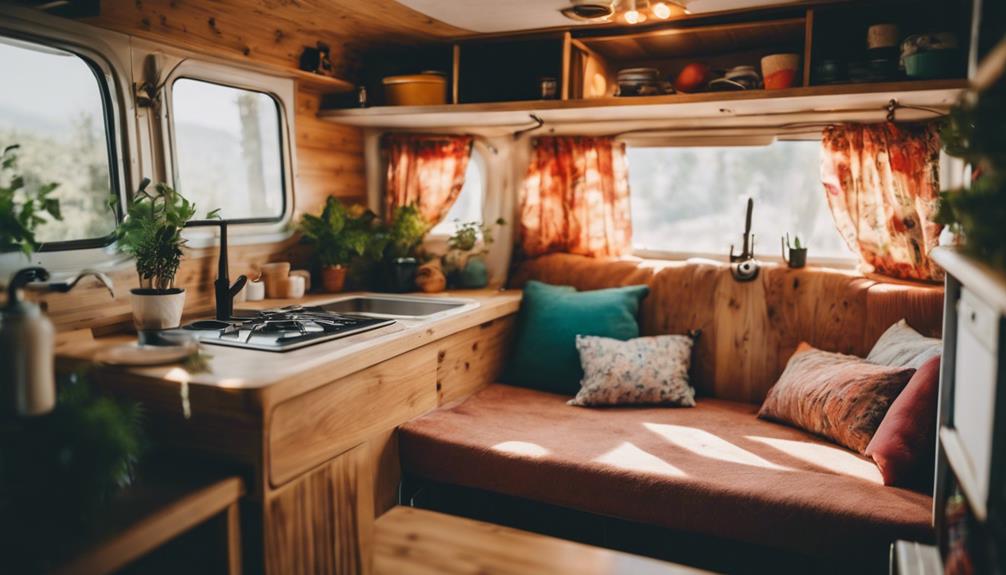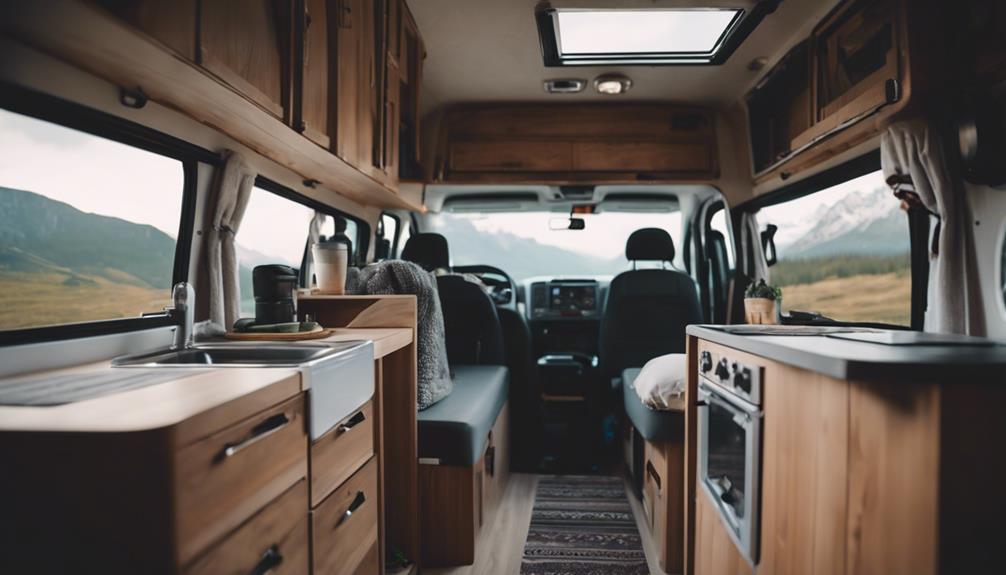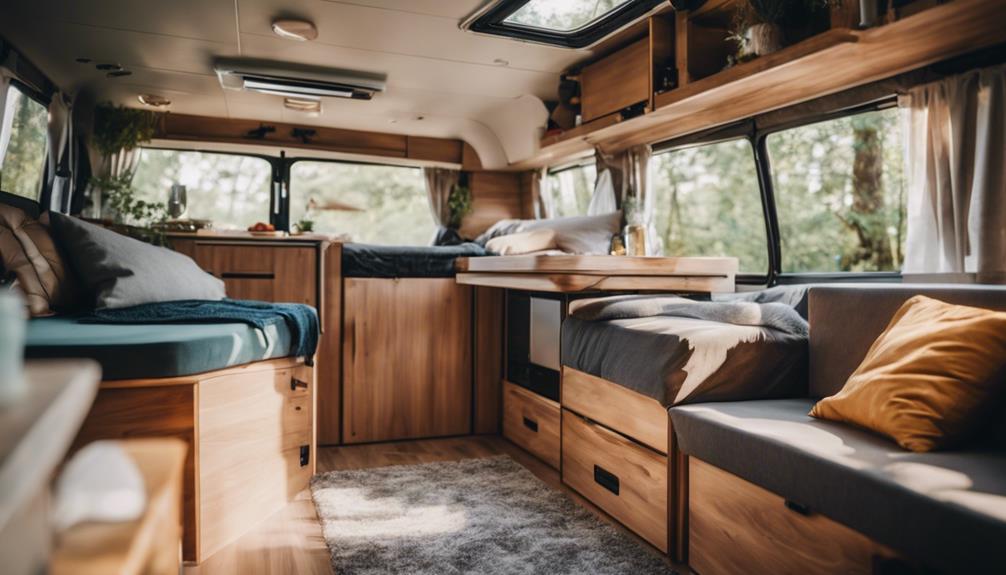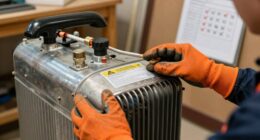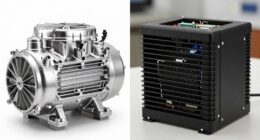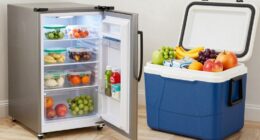The cost of a camper conversion can vary widely, ranging from about $1,000 for a basic DIY setup to more than $100,000 for high-end professional builds. If you're going the DIY route, you could start at around $4,082 and save thousands by using reclaimed materials. For professional conversions, expect to invest at least $30,000. Additionally, you'll need to take into account costs for materials, insulation, and kitchen setups, which can add up quickly. There's a lot to factor in, so keep going to discover how to navigate your options and budget effectively.
Introduction
When considering a camper van conversion, you'll quickly discover that costs can vary widely based on your choices and needs.
The price of materials and the type of conversion you choose play significant roles in your overall expenditure. If you're thinking about a DIY conversion, you could potentially save over $1,500 by using reclaimed materials and second-hand items. On the other hand, a professional conversion can easily exceed $100,000, especially when you factor in essential components like electrical systems and kitchen setups, which can add another $3,000 to $12,000 to the total.
For small camper van conversions, you might find average costs ranging from $1,000 to $5,000, while larger setups could climb between $2,000 and $10,000.
If you're starting with a used van, expect to spend anywhere from $10,000 to $25,000, depending on the model. Popular choices like the Sprinter or Ford Transit are often sought after.
Understanding these van conversion costs will help you budget effectively and make informed decisions, ensuring your camper van conversion aligns with your vision and financial capacity.
Background Information
In recent years, you've likely noticed a surge in DIY van conversions as more people embrace the freedom of customizing their own spaces.
Alongside this trend, eco-friendly materials are becoming popular, allowing you to create a sustainable living environment.
Understanding these shifts can help you make informed choices for your own camper conversion project.
Rise of DIY Van Conversions
DIY van conversions have surged in popularity as more people seek budget-friendly ways to create personalized living spaces on the road. By choosing the DIY route, you can greatly reduce costs compared to hiring professionals.
Basic camper conversions can start around $4,082, but with careful planning and resourcefulness, you could save money by sourcing second-hand materials and doing the labor yourself. In fact, by avoiding labor costs, you might save over $1,500.
Many van lifers are part of a growing community that shares invaluable resources and tips, making it easier for you to navigate the conversion process. You'll find online guides and tutorials that provide step-by-step instructions, whether you're tackling an electrical system or creating a cozy living area.
This trend not only offers a cost-effective solution but also allows you to express your creativity and design a unique mobile home that reflects your style. As you connect with fellow enthusiasts, you'll discover a wealth of knowledge and support that makes starting your DIY van conversion an exciting and rewarding experience.
Emergence of Eco-Friendly Materials
Embracing eco-friendly materials in camper conversions reflects a growing commitment to sustainability and environmental responsibility among van lifers. As you plan your conversion, consider using materials like bamboo, reclaimed wood, and recycled metals. These options not only minimize environmental impact but also enhance the aesthetic appeal and durability of your build.
When it comes to insulation, eco-friendly options such as sheep's wool and denim provide excellent thermal performance while being biodegradable and non-toxic. Incorporating solar panels and energy-efficient appliances has become standard for those focused on off-grid living. These upgrades considerably reduce your reliance on fossil fuels and lower energy costs.
Brands are increasingly offering sustainable alternatives for cabinetry, flooring, and furnishings, catering to a demographic that prioritizes eco-conscious choices. By choosing these eco-friendly materials, you're not just creating a comfortable space; you're also contributing to a broader movement of sustainability.
Ultimately, your camper conversion can reflect your values, showcasing your commitment to the environment while enjoying the freedom of van life.
Eco-Friendly Conversion Materials
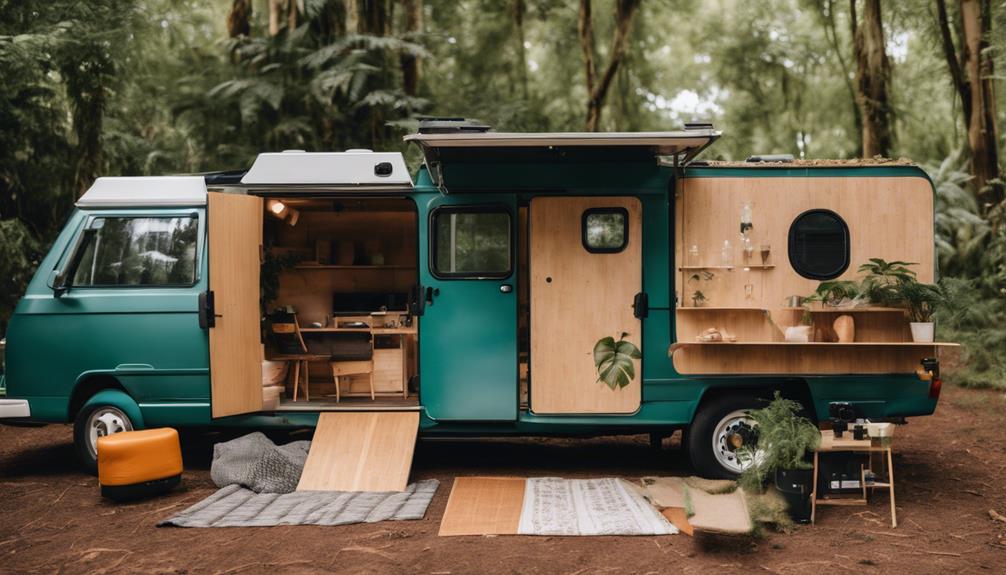
When converting your camper, choosing eco-friendly insulation materials can make a big difference.
Options like sheep's wool or recycled denim not only help the environment but can also enhance your van's comfort.
Let's explore the sustainable insulation choices available to you and how they impact both your budget and your eco-conscious goals.
Sustainable Insulation Materials
Sustainable insulation materials, like sheep's wool and recycled denim, not only offer effective thermal regulation but also help reduce your environmental footprint. These eco-friendly options are biodegradable, meaning they won't contribute to landfill waste.
One popular choice is 3M Thinsulate, known for its high insulation values while remaining thin and lightweight—perfect for tight spaces in your camper.
You can also consider using reclaimed materials, such as old blankets or carpets. Not only do they provide decent insulation, but they greatly cut costs and lessen your environmental impact.
Hemp insulation is another excellent option; it's naturally mold-resistant and offers great acoustic properties. Although it might be pricier than traditional materials, the benefits to your living environment are worth it.
Investing in sustainable insulation materials leads to a healthier living environment inside your van. Many of these options are free from harmful chemicals and VOCs (volatile organic compounds), ensuring that you breathe cleaner air.
Sustainable Insulation Options Available
Eco-friendly insulation options for camper conversions offer a variety of materials that enhance comfort while minimizing environmental impact.
You can choose from sustainable solutions like 3M Thinsulate, which provides excellent thermal performance and noise reduction. Recycled denim insulation is another option, boasting a similar R-value to traditional materials while being eco-friendly.
If you're looking for a natural, biodegradable choice, sheep's wool insulation is perfect. It effectively regulates moisture and temperature, making it suitable for varying climates.
Cork insulation panels also stand out, as they offer soundproofing and thermal properties while being harvested sustainably from renewable cork oak trees.
Cellulose insulation, made from recycled paper products, is treated with fire retardants, making it both effective and eco-friendly for your van.
Additionally, natural fibers like hemp or cotton batts not only reduce your environmental impact but also provide good thermal properties without harmful chemicals.
Cost Comparison of Materials
When you're planning your camper conversion, understanding the cost benefits and drawbacks of different materials is essential.
Industry experts can offer valuable insights into which options provide the best value for your needs.
Evaluating these material costs can help you make informed decisions that fit your budget and enhance your camper's functionality.
Material Cost Benefits and Drawbacks
Choosing the right materials for your camper conversion can greatly impact both your budget and the overall quality of your build.
For instance, insulation materials can range from $120 for basic options to over $650 for high-end choices. This difference affects thermal regulation, so it's vital to take into account your needs. Similarly, flooring solutions start at about $150 but can exceed $1,000 for premium versions, influencing both aesthetics and durability.
Kitchen installations also vary widely, from minimal setups costing around $95 to full configurations that can reach over $2,600. Your material choices here can greatly influence your overall budget. One effective way to save is by using reclaimed materials or second-hand items, which can lead to more than $1,500 in cost reductions compared to new purchases.
Don't forget about the total tool cost, averaging $363. You can minimize this expense by borrowing or renting tools, making DIY conversions even more cost-effective.
Ultimately, balancing quality and cost will guide your material choices and help you achieve a camper conversion that fits both your vision and your wallet.
Industry Expert Insights
Industry experts emphasize that understanding the cost differences between materials can greatly influence your camper conversion budget and overall satisfaction with the final result.
When planning your camper van conversion, consider the van conversion cost associated with various materials. For instance, basic insulation costs range from $120 for low-cost options to $650 for high-end materials. This choice can greatly impact your interior build, especially in varying climates.
Water systems also reflect a substantial cost variation. Low-cost setups start at around $80, while high-end systems can reach $634, affecting your overall functionality.
Kitchen installations present another wide-ranging expense, with basic setups around $95 but high-end kitchens exceeding $2,600. Flooring and wall materials can range from $150 to $1,000, influencing both aesthetics and durability.
Lastly, ventilation and window installations are essential for comfort, ranging from $223 for basic setups to over $1,000 for high-quality options.
Material Cost Evaluation
Evaluating material costs is essential for creating a camper conversion that meets your budget and design needs. You'll want to conduct a thorough material cost evaluation to understand the total cost involved.
For insulation costs, expect to pay anywhere from $120 for low-cost options to $650 for high-end materials, depending on your climate.
Flooring expenses can also vary widely; you might spend around $150 for budget-friendly choices, while high-end flooring can reach up to $1,000.
When it comes to water system setups, basic systems start at $80, with mid-range options around $138 and high-end exceeding $634.
Kitchen installations can set you back anywhere from $95 for a simple setup to a whopping $2,600 for a fully equipped kitchen.
Finally, furniture materials play a significant role in your budget. You could allocate $250 for minimal builds, but high-end furniture can cost up to $2,200.
Considering these factors will help you make informed decisions based on the types of vans you're converting, ensuring your camper conversion aligns with both your vision and your wallet.
Budgeting for Eco-Friendly Materials
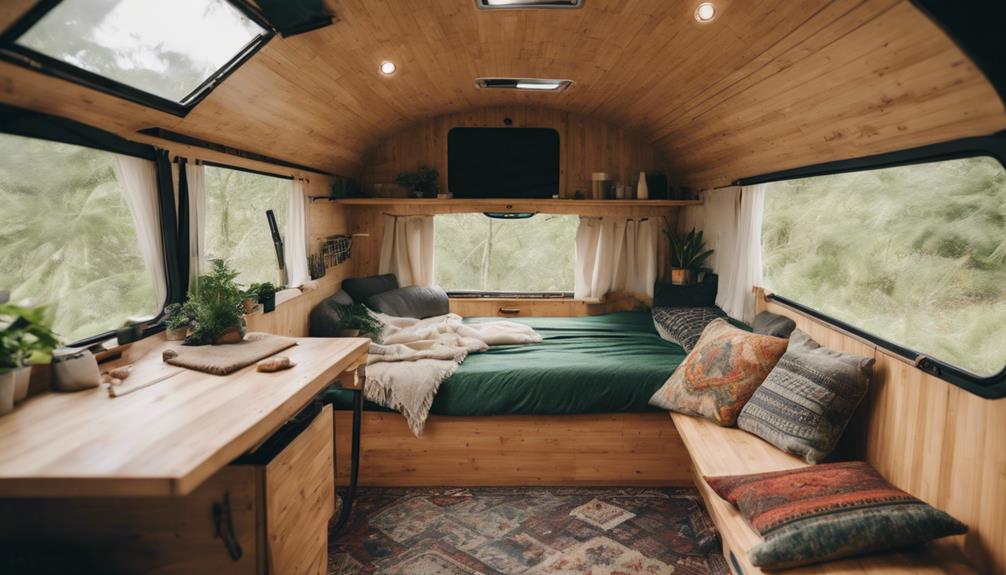
When you're budgeting for eco-friendly materials, it's essential to reflect on both your selection process and local sourcing options.
Choosing materials like reclaimed wood or bamboo not only helps the environment but can also keep costs manageable.
Eco-Friendly Material Selection Process
Choosing eco-friendly materials for your camper conversion not only aligns with sustainable practices but can also fit within a reasonable budget.
Start by considering your insulation options. High-quality eco-friendly insulation, like 3M Thinsulate, costs around $1.50 per square foot and enhances energy efficiency.
For flooring and cabinetry, using reclaimed wood or recycled materials can greatly reduce conversion costs, potentially saving over $1,500 compared to new materials.
Don't overlook finishes; budgeting for low-VOC paints and natural sealants can add around $100 to $500 to your overall conversion cost, but they improve indoor air quality.
While investing in solar panels and energy-efficient appliances may increase your upfront costs by $1,500 to $5,000, it leads to long-term savings on energy bills and helps minimize your carbon footprint.
Sourcing Local Sustainable Materials
Sourcing local sustainable materials can't only enhance your camper conversion's eco-friendliness but also help keep your budget in check. By focusing on reclaimed wood, you can often find quality materials for free or at a low price from local suppliers or demolition sites. This approach allows you to cut costs considerably compared to the price of a new build.
When it comes to insulation, consider eco-friendly insulation options like sheep's wool or recycled denim, which can range from $300 to $650. These materials not only provide excellent insulation but also support sustainability.
For cabinetry, bamboo is a great choice, typically costing around $1,000, offering durability while remaining renewable.
Don't forget about local timber merchants; they often have better prices and higher quality sustainable options than big chains. Connecting with local van lifers and DIY communities can also open doors to shared resources and valuable tips on sourcing sustainable materials.
What is the average price breakdown for a camper conversion?
The camper conversion cost comprehensive typically includes the price breakdown for materials, labor, and any additional features such as electrical systems, plumbing, and insulation. The average cost can range from $5,000 to $20,000, depending on the size of the vehicle and the level of customization desired.
Conclusion
Ultimately, understanding the wide range of costs involved in a camper conversion can help you make informed decisions that fit your budget and lifestyle.
Whether you're considering a DIY van conversion or opting for professional van conversions, knowing the conversion costs is essential. From the upfront cost of purchasing a van, which can range from $1,000 to over $100,000, to the key components like electrical systems and kitchen setups, costs can vary considerably based on quality and complexity.
For a DIY project, you might spend as little as $4,082, but high-end builds can exceed $96,892.
If you choose professional services, expect to invest at least $30,000, with potential hidden fees and unexpected expenses adding to your total.
It's critical to budget for these factors to avoid unpleasant surprises during your campervan conversion journey.
Frequently Asked Questions
How Much Does It Cost to Do a Campervan Conversion?
When you're planning a campervan conversion, costs vary widely. A basic DIY project might start around $4,000, while custom builds can soar over $100,000, depending on materials and features you choose.
How Much Does a Ford Transit Camper Conversion Cost?
A Ford Transit camper conversion typically costs between $8,998 for basic setups and over $100,000 for luxury designs. Your choices in amenities and customization will greatly impact the final price you pay.
Do Converted Campervans Hold Their Value?
Yes, converted campervans can hold their value well, often retaining 60% to 80% of their purchase price. Factors like quality, condition, and demand greatly influence their resale value, so choose wisely for better returns.
Is It Cheaper to Convert a Van to a Camper?
Yes, it's cheaper to convert a van to a camper than buying a pre-built one. You can save considerably by opting for DIY, customizing your space, and using reclaimed materials for budget-friendly solutions.
Conclusion
In summary, converting a camper into an eco-friendly space can be both rewarding and cost-effective.
By choosing sustainable materials and planning your budget wisely, you can create a comfortable environment without breaking the bank.
Remember to compare prices and prioritize the materials that align with your values.
With careful consideration and a bit of creativity, you'll have a camper that not only meets your needs but also supports a greener planet.
Happy converting!

